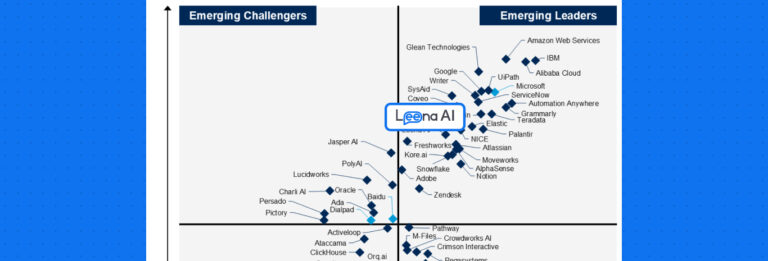The evolving employee expectations no longer give HRs an option to limit themself to an administrative or transactional role of hiring, training, or payroll management. Instead, HRs are now expected to become strategic business partners, brand builders, experience designers, and catalysts in paving the way for an organization’s digital transformation.
Unfortunately, due to the vast responsibilities and limited time and resources, HRs spend most of their time managing routine processes, policies, and frameworks. They have to indulge in high-volume, repetitive tasks of responding to everyday questions of employees to ensure that the workforce has all the necessary information for proper functioning. However, this constantly distracts HRs from the higher-value work and precludes the department from serving or being seen as strategic business partners.
This is why HR leaders need to explore newer avenues and technologies to get ahead and artificial intelligence (AI) is at the forefront. AI-powered digital virtual assistants (VAs) automate the bulk of the mundane and routine work of the HR team and allow HRs to use this free time for workforce development and proactive employee engagement.
Does this mean AI-powered virtual assistants can do everything that an HR does?
Maybe yes, maybe no.
Read this blog to know what virtual assistants can and cannot do.
But first, what is an AI-powered virtual assistant?

AI-powered virtual assistants use advanced artificial intelligence (AI), natural language processing, and machine learning to simulate human-like conversations with employees. These are ultra-sophisticated versions of chatbots that understand and respond to employee queries without being explicitly programmed.
Virtual assistants are extremely valuable in streamlining and refining HR operations. Organizations integrate these assistants to automate different processes, such as onboarding, offboarding, document management, and query resolution for improving employee experience, boosting satisfaction, driving loyalty, and enhancing employee engagement throughout the employee journey.
What can digital virtual assistants do for HRs?

Apart from helping organizations save productive man-hours and enabling HR teams to focus on strategic initiatives, virtual assistants also have an enormous impact on enterprises in the help desk area. Here are some of its use cases showcasing what it can do:
 Recruitment
Recruitment
Recruitment is a laborious, time-consuming, and challenging process. Leveraging AI-powered virtual assistants can help HRs simplify the search for ideal candidates. Since VAs have access to vast data from siloed systems, they can sift through it to manage heaps of candidate applications and shortlist profiles that meet the selection criteria for a particular position, thus improving the overall talent acquisition process.
The digital virtual assistant also aids HRs in scheduling the interview of shortlisted candidates, collecting their information via pre-recorded questions around skills, training, previous experience, compensation, or anything relevant to the position they applied for. It replaces the first-level interactions between the recruiters and candidates and frees up the talent acquisition team to let them respond to more critical issues effectively.
Once the ideal candidate is identified, the virtual assistant determines the likelihood of the candidate accepting a job offer and even helps structure a competitive compensation package.
However, if the candidate drops out of the hiring process, virtual assistants gather their feedback to identify potential areas for improvement within the organization. Ultimately, all of these applications of AI and virtual assistants contribute to a lower cost-per-hire. Most essentially, it improves the candidate experience – a key factor in today’s tight labor market.
 Training and development
Training and development
Training and development are the core HR processes. Unfortunately, traditional training practices do not work effectively, especially in remote or hybrid work environments. Whereas AI-driven virtual assistants make an excellent medium for training employees right from their onboarding.
A digital virtual assistant takes employees through accurate and predefined steps to impart knowledge about the new organization and what is expected of them as new employees. It trains employees during the first 90 days or more, which HRs generally do not have the bandwidth to do.
The training helps employees increase their performance potential gradually. Over time, VAs learn employees’ strengths and weaknesses to support customized and personalized learning and development. They provide relevant training material and learning suggestions based on users’ interests and job responsibilities, enabling more efficient upskilling and reskilling.
Virtual assistants can also manage multiple managerial tasks associated with learning and development (L&D), like course scheduling, feedback collection, or report generation on the quality of training and employee satisfaction.
The driving force here is that virtual assistants make L&D more dynamic for employees because it is a two-way communication process. Employees feel encouraged to ask questions as they receive answers in no time. Besides, they enjoy the flexibility of learning at their pace in the stipulated time.
 Case resolution
Case resolution
There is a lot that happens every day in the organization. Consequently, employees always need assistance from HR and the IT team to resolve their issues and help them stay focused on their work. Be it related to performance, work location, policies, payroll, system/software access, password resetting, system slowness, audio issues, keeping the system secure from potential threats, or any other, employees expect an instant response to avoid any unneeded downtime on their job. And so, they reach out to the HRs and the IT team via emails, messages, and phone calls, digressing them from other strategic business tasks.
However, with AI-driven virtual assistants, the query resolution and ticketing process becomes automated. Further, the seamless integration of VA with a dynamic knowledge base boosts employee self-service and satisfaction. The virtual assistants constantly learn from the experience and update the knowledge base with every interaction. As a result, employees get answers to their questions in real-time without being dependent on HRs and the IT team.
If the virtual assistant cannot answer the question, it helps employees raise tickets and triage to the right person in the organization for faster resolution.
Another use case of digital virtual assistants in case resolution is it gives HR and IT leaders the desired visibility into different metrics, including the type of queries raised, average resolution time, unresolved queries, and many other metrics. HRs and the IT team can even apply custom filters to get a comprehensive view of employee queries.
Leena AI’s case management solution for IT and HR displays all employee cases on a customizable centralized dashboard and helps boost transparency and coordination among departments in the organization. It successfully highlights the data on agent performance, gaps in the knowledge base, bottlenecks in the service desk, and employee satisfaction with HR and the IT teams’ support. HRs and the IT team can take proactive measures accordingly and expedite the ticket resolution.
 Performance management
Performance management
Evaluating the performance of the workforce via annual assessments is critical for managing talent. However, many HRs believe that the conventional review process is no longer feasible and practical. HRs spend days conducting surveys, asking employees to fill out the questionnaire, consolidating the data, and analyzing it. On top of it, chances are that data received is insufficient and inaccurate.
It is where virtual assistants can help. VAs make the performance management process smoother and more efficient. Managers and HRs can effectively gather, aggregate, and analyze employee performance data to make performance evaluations more regular, fact-based, streamlined, and effective.
Ultimately, digital virtual assistants help employees and organizations succeed by providing guidance on performance management. They focus on goal tracking, scheduling reviews, and identifying team members’ areas of improvement. It helps HRs save significant time and deliver better employee experiences.
 Onboarding
Onboarding
HRs understand that acclimating new hires into the organization is not an easy feat to achieve. It requires a systematic approach to keep new hires engaged and motivated from day 1 in the organization.
AI-driven virtual assistants become the natural choice for enterprises that want to automate and streamline their onboarding processes for delivering better employee experiences to new hires. VAs remove unnecessary steps and drudgery from the process to make it smooth and efficient for both employees and HRs.
It lets employees leverage the self-service functionality to readily access the information, whether they work remotely or in a hybrid fashion. This way, new employees resolve their questions about the company’s policies, internal processes, roles, responsibilities, etc., in the least possible time frame. HRs also find VAs extremely feasible and cost-efficient as they can be scaled and tailored for any number of employees.
Leena AI’s digital virtual assistant gets down to business once an employee accepts the offer letter. It helps HRs send offer letters, complete the documentation process, and initiate the background verification process. Our AI-driven onboarding solution automatically assigns an onboarding buddy to the new hire and sends notifications to the IT, finance, and other departments for providing assets, managing payroll, and sending ID cards. This step-by-step automated process keeps new hires engaged, reduces HR’s workload, and ensures zero to minimal dropouts. Book a demo to know how it can help you!
 Engagement
Engagement
Virtual assistants have been a game changer in revolutionizing employee engagement. HRs can utilize digital virtual assistants to roll out pulse surveys and understand employees’ sentiments. This way, HRs can pull the right levers of workforce engagement.
The virtual assistant collects employee feedback effortlessly and anonymously (if required) to let HRs derive actionable insights from the data. HRs can then share the details with the top management for informed decision-making and remedial measures.
The insights driven by virtual assistants help HR leaders create a workplace environment where employees feel motivated and committed to the company’s values, goals, and everyday work responsibilities.
Enterprises should choose an AI-driven virtual assistant, like Leena AI’s engagement solution, to ask employees more in-depth questions and analyze their sentiments and engagement levels at work. The intelligent actionable insights generated on our engagement dashboard allow you to determine the disengaged, unhappy, and willing-to-leave employees. It helps HRs take timely actions and retain such employees.
 Retention
Retention
While there are a lot of factors that impact employee retention, there is no reliable answer to why employees leave a company. Artificial intelligence and machine learning-based virtual assistants pinpoint employees at risk of resigning to let organizations practice early intervention and decrease attrition rates.
The AI-driven virtual assistant focuses on analyzing employees’ sentiments via surveys, reviews, and other forms of feedback to get an overview of the organization’s culture and overall job satisfaction. The insights generated through these surveys reveal the factors contributing to high employee turnover, helping HRs drive engagement efforts and retention strategies efficiently.
 Offboarding
Offboarding
An offboarding virtual assistant ensures that employees leaving the organization exit gracefully. And for that, companies must have a standard, comprehensive offboarding process that ascertains all the steps are carried out carefully
While performing all the steps manually can be error-prone, using an AI-driven virtual assistant can be a win-win for both organizations and departing employees.
The AI-powered virtual assistant automates all the steps – from acknowledging the resignation letter to notifying the managers and team members, revoking access to the applications, documents, and sensitive information, collecting assets, initiating F & F, and conducting exit interviews.
Leena AI’s offboarding solution, helps organizations create a custom employee offboarding workflow to improve the experience of departing employees, while simultaneously giving organizations the opportunities to ponder the areas where improvement can be made to boost retention rates.
These are some of the use cases (but not limited to) of HR virtual assistants. But what virtual assistants can not do is still unanswered. Read the following section to find out its answer.
What virtual assistants cannot do for HRs?
Virtual assistants are the breakthrough technology that has revolutionized the HR landscape and employee experience. However, there are a few capabilities that they are yet to master, including a lack of empathy, the ability to solve complex problems, and situations where human intelligence is required.
Deep learning and conversational AI can certainly enhance the capabilities of virtual assistants, but it will take organizations time and effort to manage situations that demand creativity and improvisation.
Enterprises should understand that artificial intelligence is not a fail-proof technology and therefore, should be complemented with human intelligence. Overlooking the importance of keeping a human resource in the loop when rolling out and maintaining the virtual assistants can become a recipe for disaster!
Take-home message

The exponential growth in the market for AI-driven virtual assistants as part of help desk solutions has compelled path-finding companies to offer sophisticated VAs that automates HRs’ administrative tasks, boost employee experience, and provide business value.
But as there always is a gray area to any technology, VA-enabled HR help desk solutions also come with their speed-breakers that trailblazing companies are learning to tackle.
Choosing the right solution wisely is the key here. Enterprises that scan the solution provider landscape meticulously and find the best capable fit for their use cases will derive maximum benefit from these HR solutions.
Leena AI’s HR service delivery suite is a one-stop solution for transforming your employee experience from onboarding to offboarding and everything in between. If you are looking for the right partner to help you with the virtual assistant nitty-gritty, talk to us right away!






